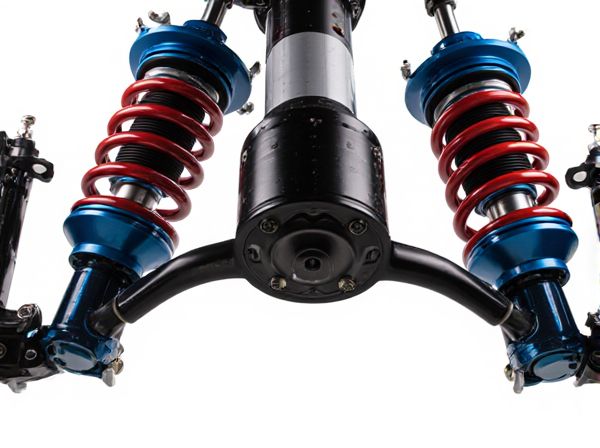
Photo illustration: Air Suspension vs Coilover Suspension
Air suspension offers adjustable ride height and enhanced comfort by using air springs, making it ideal for varying road conditions and load capacities. Coilover suspension provides superior handling and performance through a fixed spring and shock setup, favored by enthusiasts seeking precise control and responsiveness. Your choice depends on whether you prioritize customizable comfort or dynamic driving performance.
Table of Comparison
| Feature | Air Suspension | Coilover Suspension |
|---|---|---|
| Adjustability | Electronic height and firmness adjustment | Manual height and damping adjustment |
| Ride Comfort | Smooth and adaptable to road conditions | Firm and sport-oriented |
| Load Handling | Automatically adjusts to varying loads | Fixed spring rate, less adaptive |
| Durability | Complex system, higher maintenance | Simple design, longer lifespan |
| Cost | Higher initial and repair costs | More affordable and cost-effective |
| Performance | Comfort-focused, ideal for luxury vehicles | Performance-focused, ideal for sports cars |
Introduction to Suspension Systems
Suspension systems are critical for vehicle stability, handling, and comfort, with air suspension using compressed air to adjust ride height and stiffness dynamically. Coilover suspension combines a coil spring and a shock absorber into a single unit, offering precise mechanical tuning for performance and responsiveness. Understanding the differences in design and function helps in choosing the right suspension system tailored to driving needs and road conditions.
What is Air Suspension?
Air suspension is a vehicle suspension system that uses airbags made of reinforced rubber and plastic instead of traditional steel springs. These airbags are inflated or deflated with compressed air to adjust the ride height and improve comfort, handling, and load-carrying capacity. Air suspension systems provide customizable cushioning and are commonly used in luxury cars, trucks, and SUVs for enhanced ride quality and adaptability.
What are Coilover Suspensions?
Coilover suspensions combine a coil spring encircling a shock absorber into a single unit, offering adjustable ride height and improved handling performance. These systems allow precise tuning of damping and spring stiffness to optimize vehicle dynamics for various driving conditions. Popular in motorsports and performance vehicles, coilovers enhance cornering stability and responsiveness compared to standard suspension setups.
Key Differences Between Air and Coilover Suspensions
Air suspension systems provide adjustable ride height and improved comfort by using compressed air bags, while coilover suspensions offer fixed ride height with superior handling and precise damping control through coil springs and shock absorbers. Air suspensions excel in load leveling and adaptability for varying road conditions, whereas coilovers deliver enhanced performance and stability for aggressive driving and track use. Maintenance requirements differ as air suspensions involve compressors and air lines subject to leaks, while coilovers typically require less frequent servicing but may need spring or damper replacements over time.
Ride Quality Comparison
Air suspension delivers a smoother ride quality by adjusting air pressure to absorb road imperfections dynamically, offering superior comfort over various terrains. Coilover suspension provides a firmer, sportier ride with precise handling, as its spring and damper combination is fixed and less adaptive to changing conditions. For those prioritizing luxury and adaptability, air suspension excels, whereas coilovers favor drivers seeking responsiveness and performance.
Performance and Handling
Air suspension offers adjustable ride height and superior comfort, allowing drivers to fine-tune performance based on road conditions, while coilover suspension provides a more rigid setup that enhances cornering stability and precise handling. Coilovers typically deliver better feedback and consistent tire contact during aggressive driving, making them ideal for performance enthusiasts seeking control and responsiveness. Air suspension systems excel in adaptability but may sacrifice some responsiveness compared to coilovers, which are preferred for track-focused performance and improved handling dynamics.
Adjustability and Customization
Air suspension systems offer superior adjustability by allowing drivers to modify ride height and stiffness on the fly through electronic controls, making them ideal for adapting to varying road conditions and comfort preferences. Coilover suspensions provide customizable performance through manual adjustments of spring preload and damping settings, enabling precise tuning for handling and stance but requiring physical intervention. Both systems enhance vehicle dynamics, yet air suspension excels in convenience and versatility, while coilovers appeal to enthusiasts seeking hands-on customization and improved cornering response.
Installation and Maintenance
Air suspension systems require complex installation involving compressors, airbags, and electronic controls, demanding professional expertise and more time compared to coilover suspensions. Coilover suspensions offer simpler installation with fewer components, primarily consisting of shock absorbers and coil springs, allowing for quicker setup and easier adjustments. Maintenance for air suspension includes regular checks of air lines, compressors, and electronic sensors to prevent leaks and failures, while coilovers generally need routine inspection for wear and tear, with occasional spring and shock absorber replacements.
Cost and Long-term Value
Air suspension systems generally have a higher initial cost, ranging from $2,500 to $5,000, but they offer adjustable ride height and improved comfort, which can enhance long-term vehicle value. Coilover suspensions are more affordable upfront, typically costing between $1,000 and $2,500, and are favored for performance and durability with lower maintenance costs over time. Considering long-term value, air suspensions may require more frequent repairs, potentially increasing total ownership cost despite their added versatility.
Which Suspension is Right for You?
Choosing between air suspension and coilover suspension depends on your driving needs and preferences. Air suspension offers adjustable ride height and superior comfort, making it ideal for daily driving and load-carrying vehicles. Coilover suspension provides better handling and performance, favored by enthusiasts who prioritize precision and track capabilities.
 caratoz.com
caratoz.com